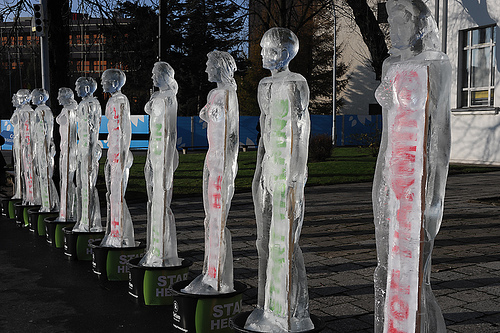Too Little… But Not Too Late
Heather Coleman, Oxfam America’s senior policy advisor for climate change, shares her hopes for the new year.

I returned from the UN climate negotiations in Poznan, Poland at 1:00 am on Monday morning feeling drained and disappointed yet hopeful for what’s to come.
The conference was meant to be a key milestone between the start of global climate negotiations in Bali last year and the goal to reach a new global climate agreement in Copenhagen next year. But it exposed a shameful lack of progress. Developed nations failed to submit proposals to reduce their greenhouse gas emissions and provide adequate financing for poor countries to “adapt” to, or become stronger in the face of, climate change.
In contrast, many of the poor countries came to Poznan with clear proposals, a willingness to show flexibility, and a strong voice. They delivered a clear message that the world’s poor people have done nothing to cause climate change but are feeling the impacts first and worst. They told countless tales of island peoples who are being relocated to higher ground, of mothers who are forced to walk up to 10 miles just to collect water for their children, and of communities who have been ravaged by unprecedented floods and drought.
Still, the only area of progress in Poznan came with adaptation. The conference negotiators agreed to establish an Adaptation Fund, which will receive about $200 to $300 million annually beginning in 2012. However, this is far less than the minimum of $50 billion that Oxfam estimates is needed to fund adaptation in developing countries. After exhaustive negotiations, the developed countries rejected a strong push for additional funds. Developing countries vehemently condemned this move, citing the urgent needs of vulnerable people suffering from a crisis they did not cause.
So, why in the world do I still feel hopeful?
With the new year, comes some real potential. President-Elect Barack Obama continues to publicly reaffirm his commitment to addressing the climate crisis by reducing emissions here in the US and re-engaging in international negotiations as soon as he takes office. Just look at his new energy and environment team. They have demonstrated a sincere commitment to climate change and we have every reason to believe that they will put their energy behind reaching a global climate deal by 2009. For example, Carol Browner, the new energy and climate czar, has been a personal heroine of mine since she first became EPA administrator under Clinton in 1993. I believe she has the chutzpah to make things happen. In addition, Senator Kerry and former Vice President Al Gore were both in Poznan and have been in close communication with President-Elect Obama on the state of the negotiations and the need for US leadership.
Next year will be a busy one as there are already four negotiating meetings scheduled. But I have no doubt that this team will have a major influence in representing the interests of poor people in the climate negotiations as the year unfolds.
Cheers to 2009 – the year of possibilities for our climate.